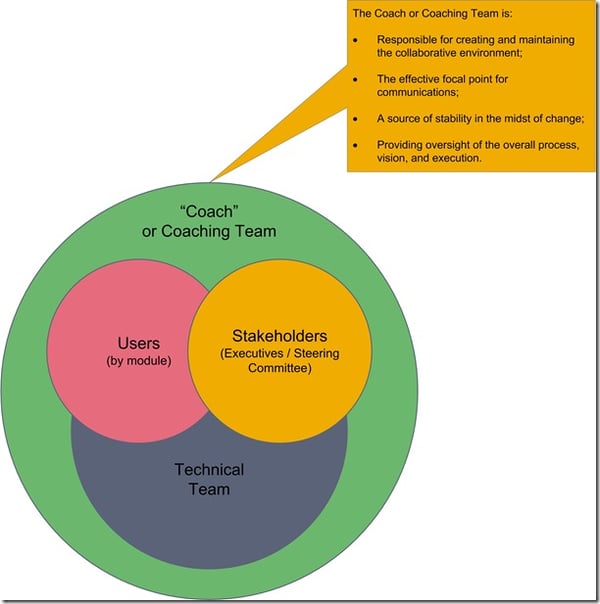One of the big mistakes made by folks buying technologies is thinking that the vendor or the VAR (value-added reseller) can provide the project manager for their implementation project.
They cannot, if you really mean a project “manager.”
And they cannot for a very good reason—a reason with which even you, as an executive or manager in your own firm, probably agree. But the reason you probably don’t agree with what I’ve said so far is because you have never really thought the matter through completely.
What is a Project Manager?
The IT industry is shot-through with wrong usage or incorrect application of the term “project manager.”
You see, the term “manager” implies direct authority.
Yet, project managers almost never have any direct authority over the resources provided by the client to direct these resource to change their priorities (e.g., give priority to project efforts over their day-to-day activities at the firm), to assign new or different client resources to the project when some project task falls behind schedule or fails to come up to expectations in some other way, or to take other actions that may directly affect client-supplied project resources.
A real and effective “project manager” must have direct authority over the resources assigned to the project. Otherwise, his or her role is not a “manager.” He may be fulfilling some other role. He might be a project “watchdog,” reporting progress or lack thereof to senior management. She might be a project “coordinator,” doing her best to coordinate the resources assigned to the project. But, in the absence of authority to take direct action to effectively deliver the project’s desired outcomes, the so-called “project manager” cannot truly be a “project manager.”
How I See the Consultant’s Role on Most IT Projects

When a VAR or vendor provides leadership to an IT project, the most suitable role for the leadership from the VAR or vendor is a coaching role. Generally, consultants working in this capacity have a clear overview of the project—even in the absence of manifest authority to direct the internal resources of the client.
The consultant functioning in this role also brings with him or her advantages that many internal project managers may not have including:
- Domain expertise with the technologies involved in the project
- Years of comprehensive experience with similar IT projects
- Knowledge of best practices garnered from experience with similar clients in the same or closely related industries
- Skills as a business analyst to help connect the IT language with the business language in order to help bring about the best business result from the technologies being applied
- A clear view of both the business aspects and the technology aspects across multiple silos of interest in the enterprise
- Experience and abilities to assist in managing change and communicating the need for adaptation of business processes to the new technologies
- Wisdom to help the client achieve the lowest total cost of ownership (TCO) and rapid ROI (return on investment) through the proper blend of adoption, adaptation, extension and (minimal) modification of the technologies
The Importance of the Executive Sponsor
Acknowledging all of this about the need for having an internal project manager brings up some other important points. First, that both parties—clients and VARs/vendors—should cease to pretend that the VAR or vendor is providing “project management,” or, worse, blaming the VAR’s or vendor’s “project manager” when things go awry.
Also, it highlights the absolute need for every significant project to have an executive willing to take a proactive role in assuring the project’s success. The firm’s internal (real) project manager will need executive support when project demands conflict with the demands coming from line managers requiring the services of the same resources.
Equally as important, however, is the need for the actively involved executive to put weight behind the guidance provided by the consultant (or consulting team) functioning as “coach” to the project. After all, the firm is paying for access to these specialized resources. To let their guidance fall to the ground because there is no executive support for it seems to be a waste.
Worse can also happen.
When executives remain at arms’ length from the project and believe that the project is safe in the hands of a “project manager” (falsely so-called) provided by the VAR or vendor, it is not uncommon for the executive to not be given a truly accurate picture of the causes of project failure or “scope creep” when things do not go as expected or cost overruns surprise the CFO.
Summary
I am firmly convinced that clients, along with IT VARs and vendors, would be better off if all involved would distinguish real project managers from “project managers” in name only. I also believe that there would be fewer project failures if executives and managers—at both the clients’ offices and the offices of the VARs and vendors—would recognize where project authority exists and when and where it does not,
Consultants from VARs and resellers make great project “coaches” and can provide a tremendous amount of value when properly engaged in projects and provided with appropriate levels of executive involvement. However, when the clients or the vendors pretend they have a project manager involved in the project when no actual project authority exists, then they are opening the door for the all too common IT project failure.
We would like to hear what you have to say on this subject. Please leave a comment here, or contact us directly.



